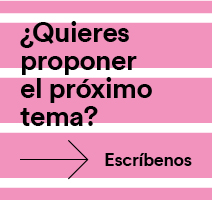Give your opinion
What is this thing called Philosophy?
Cristina Febrer Nafría, student of Degree in Philosophy, Politics and Economics (PPE), shares with us a reflection on the importance of Philosophy in our lives: What is it? What is it for?

What is this thing called Philosophy," you say as you stick your blue pupil into my pupil.
your blue pupil into my pupil.
What is Philosophy? And you're asking me?
PhilosophyIt's you.
It was something similar, wasn't it? Although Bécquer was talking about poetry, I have allowed myself to take his Rima XXI and adapt it for the topic of my essay. This poet has some beautiful letters: "Literary Letters to a Woman. In one of them he explains the content of this poem and ends with a little treatise on love. They say that it is by imitating the great masters that one learns. So I have decided to write a "literary letter" to purpose from this variation on Becquer's poem to make a little treatise on what is Philosophy.
The philosopher Willard Van Orman Quine begins his article1 with the question: "What is this thing called Philosophy?". He stresses one idea: Philosophy, like science, has become specialised and fragmented. That is why it now "no longer addresses itself to the common man, nor tackles problems of broad human interest".2 Quine praises Frege, the driving force behind the new logic. I pity anyone who has read any of his pages, for Frege may be a serious and hard-working man, but reading him is a difficult business . If the Philosophy is nowconsidered only as pure analytical Philosophy , it is normal that he has lost the contact with the people and wants to withdraw from the classrooms, as it is not going to help the students to find a good work.
But Philosophy is not only that. It should address everyone and deal with human problems. As I indicated earlier, Philosophy is you. And this is so for two reasons: first, because it is connatural for human beings to want to know, and second, because Philosophy should engage the whole of life.
To illustrate the first reason I bring this conversation I overheard between a mother and her son:
- Mum, will you buy me an ice cream?
- No, son, ice cream is for the summer.
- And why do they advertise them now if they are for the summer?
Not only do I think the mother needs to look for more solid arguments, but I was amused by the child's concern: it doesn't make sense to advertise ice cream now if it's for the summer. Children are little philosophers because they do what philosophers do: ask questions.
I don't believe that human beings stop doing Philosophy and therefore stop asking questions. But I am concerned that Philosophy is not studied in schools. It is good to teach people to think of well-argued answers to the questions they ask. And if they don't ask questions because they are numb with social networks and screens, it is good to be a gadfly like Socrates and provoke them to ask questions. Because Philosophy compromises how we live. With the example of ice cream we can ask ourselves: why not have an ice cream at that moment when we feel like it? Should we respond to our appetites? Or is it better to learn to wait? The Philosophy will not give a canonical answer to these questions, but it will give us tools to help us direct our thoughts and actions.

A first year student at Philosophy was telling me how she was sorry to be taken out of curriculum school. She told me how it helped her as a teenager to find meaning in her life. I don't know whether the new subject "Civic and Ethical Values" will help students to ask themselves about the meaning of their lives or rather teach them what it should be... Quine accuses philosophers of being "crackpots" for "having a speculative and unorganised character"3. The Philosophy has a different mode of being from science. The Philosophy aspires to contemplation. I do not agree agreement with Quine that "the student who devotes himself to Philosophy mainly for spiritual consolation is mistaken and will probably never be a good student, for it is not intellectual curiosity that moves him"4. The Philosophy is born out of wonder, later on it will awaken intellectual curiosity.
An example perhaps best illustrates what I am saying. The other day I went to Musicosophya musico-philosophical concert. In it, the lyrics of several songs were analysed philosophically and then played live. The concert-goers and the musicians had heard these songs before, had been amazed by their melodies... and once amazed, they were curious to know what the lyrics said.
Philosophy and science can help each other, but they do not need to share methods to be both valid. Let the scientists stay in their laboratories and in their formulas. I prefer to stay with the dialogue between friends, with metaphysical concepts, with questions for the love of wisdom. I prefer to stay with this thing called Philosophy.
This essay was written for the subject of Philosophy of Language taught by Professor Jaime Nubiola at the School of Philosophy and Letters of the University of Navarra. It is published in the blog Un atardecer en el campus.
1 I refer to article Has the Philosophy lost the contact with the people?
2 W.V. Quine: Theories and Things, The Belknap Press of Harvard U.P., Cambridge, Mass. 1981, pp. 190-193. (Translated by Sara F. Barrena)
3 Ibid.
4 Ibid.
If you liked the article, you might be interested in one of our Degrees!









